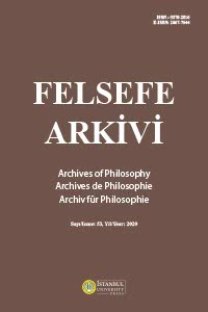İnsan Bilimleri ve Ahlakı Yargı
Bu makalenin başlıca amacı, “kültürel dönüş”, yani Batı ya da Avrupa kültürü gibi, tek bir evrenselin egemenlik düşüncesinden ayrılış ve kaynaklara ilişkin daha geniş bir spektrumdan elde edilen orijinal katkıların Avrupa kültürü ve geleneği içerisinde keşfi, soyut ve teksesli kültürel globalizmin savunmasına indirgenemeyeceğinden, belirli kültürel mirasların süregelen mevcudiyetinin genişleyen karşılıklı anlayış süreci ve yargının felsefi biçimlenişine katkı sağlayan kültürel çeşitliliğin takdiriyle birlikte ortak bir yorumlama süreci, karşılaştırmalı analiz ve eleştirel değerlendirme aracılığıyla tümü insan bilimlerinin görevleri ve ufkunu oluşturan yanlardır sürekli yenilenmeye ihtiyaç duyduğunu göstermektir. Humaniora, modern insanı, onu soyut, izole edilmiş, ve tarihsiz bir şekilde sosyal açı-dan içerisinde yer aldığı toplumda sosyal haklardan yoksun olarak kavramsallaştıran yerinden edilmiş birey olarak ele almamalıdır. Ancak bunun yerine varolan devletler ve sosyal kurumlar içerisinde insan bilimleri, kendilerini Aydınlanmanın mirasçıları olarak görenlerin medenilik seviyesini geliştirmenin peşinde olmalılardır. Temel soru, pleonexia’nın ahlaksal olmayan üzümlerinden refah içerisindeki devletin ahlak şarabının nasıl sıkılacağıdır ve bu insan bilimlerinin en özsel sorularından biri olmaya devam eder.
Anahtar Kelimeler:
İnsan Bilimleri, Hermeneutik, Yaşam Dünyası, Fenomenolojik Refleksiyon
The Human Sciences And Moral Judgment
The primary intention of the paper is to show that, in order that the “cultural turn”, i.e. the departure from the idea of dominance of a single univeral, Western or European culture, and discovery within the culture and tradition of Europe of original contributions from an ever wider spectrum of sources, might not be reduced to an apology for abstract and unisono cultural globalism, the living presence of specific cultural heritages needs to be continually renewed through a shared process of interpretation, comparative analysis, critical evaluation all tasks of the humanities and constituent aspects of the horizon broadening process of mutual understanding and appreciation of cultural diversity which contribute to the philosophical cultivation of judgment.The humaniora should not discuss the modern human being as an uprooted individual conceptualizing him as an abstract, isolated, and socially deprived subject in a society without history but they should rather aspire towards improving, within the existing states and social institutions, the level of civility for all who consider themselves heirs to the Enlightenment. The more basic question how to press the moral wine of the welfare state from the immoral grapes of pleonexia is and remains one of the most essential questions of the humaniora.
Keywords:
Humanities, Hermeneutic, Lebenswelt, Â Phenomenological Reflection,
___
- .
- ISSN: 0378-2816
- Başlangıç: 1945
- Yayıncı: İstanbul Üniversitesi
